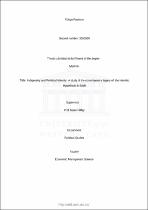| dc.date.accessioned | 2023-07-12T12:45:51Z | |
| dc.date.available | 2023-07-12T12:45:51Z | |
| dc.date.issued | 2023 | |
| dc.identifier.uri | http://hdl.handle.net/11394/10379 | |
| dc.description | Magister Administrationis - MAdmin | en_US |
| dc.description.abstract | The limited investment of the colonial authority into the development of the colony and its
people are sometimes offered as explanation for why African states seem to fail at the
democratic project. This together with the arbitrary manner within which colonial borders were
drawn without regard for culture and ethnicity have been touted as the main reason for violent
upheaval and political instability. While this may be true it is nonetheless insufficient to explain,
understand and describe the embeddedness of violence within various states on the continent.
The thesis will counter the conception of violence in Africa as only an economic colonial legacy
and will instead argue that the violence and political instability is also a product of complex
identity formation. It is argued that specific historical contexts and narratives create identities.
The creation of this will be explored and explained through the narrative of the Hamitic
Hypothesis. The Hamitic Hypothesis is a theory of race and culture which was used, adapted,
and promulgated by the colonial authority as it helped to explain and legitimate the practice of
colonial rule. | en_US |
| dc.language.iso | en | en_US |
| dc.publisher | University of the Western Cape | en_US |
| dc.subject | Political violence | en_US |
| dc.subject | Political identity | en_US |
| dc.subject | Political identity formation | en_US |
| dc.subject | Hamitic Hypothesis | en_US |
| dc.subject | Hamite | en_US |
| dc.title | Indigeneity and political identity: A study of the contemporary legacy of the hamitic hypothesis in Mali | en_US |
| dc.rights.holder | University of the Western Cape | en_US |

